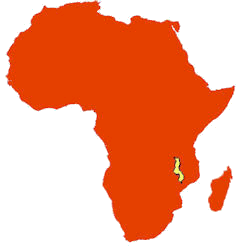How Scotia Education Trust Started
Coming into Blantyre by air
One of the Trustees was involved for 12 years in short specialised courses for Anaesthetists in Africa. Many of these teaching trips were to Malawi.. The other Trustees lived and worked in Malawi for many years.
In 2007, the local parish 150th Anniversary project was announced - to provide Mary's Meals for Mitsidi (Local Education Authority) Primary School in a rural area near Blantyre, Malawi. The following Autumn, whilst again in Malawi for teaching at Queen Elizabeth Central Hospital in Blantyre, a visit was arranged to this school.
Africa and Malawi
Malawi and its two main cities
The following were apparent on visiting Mitsidi and other schools:
School infrastructure receives little government funding and maintenance
Schools lack basic educational resources - chalk, jotters, pens, textbooks
Completion of Primary education can make a vast difference to a life
Secondary education can make even greater difference
Secondary education for Mitsidi Primary pupils was limited because
The nearby secondary school building did not have even the beginnings of a roof, only walls - bricks made by local Community
Secondary School education in Malawi is not free. Poor families cannot afford even the lowest fees and costs of Secondary education.
Incomplete brickwork in Mitsidi CDSS disappearing - March 2010
Class in Mitsidi CDSS under an awning in late 2010
Since 2008, Mitsidi Primary School has received additional parish support as well as a daily meal for the pupils at school. It was through involvement in this project, getting to know Staff in schools and reliable contractors, it was realised that improvement in infrastructure for education and obtaining better results for more children in the rural area around Blantyre would be feasible.
Older pupils in Chiraweni Primary sitting on floor in 2011
In December 2010, Scotia Education Trust was established with the aim of enabling better education as a route out of poverty and with the initial goal of converting the brick shell (photo top right) into classrooms for Mitsidi Secondary School.
The electronic age has revolutionised communication with people living in rural locations where water does not come out of taps, "toilets" are pit latrines, a "kitchen" can be 3 stones on the ground, there is no transport or electricity but mobile phones work even in remote rural areas. Emails, messages, quotations, bank statements, receipts and photos can all be sent easily. The electronic age enables far more precise confirmation that funds are being spent as expected.





